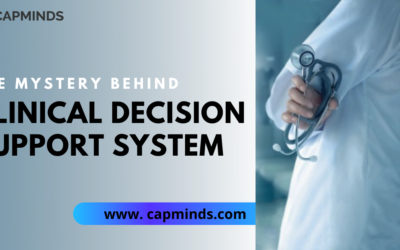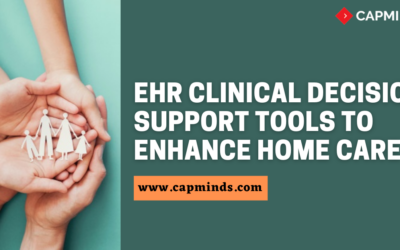What Is a Clinical Decision Support System – A Complete Guide for 2025
Clinicians must manage large volumes of patient data while making precise decisions in this complicated healthcare environment. A CDSS is a sort of medical decision support software meant to help healthcare staff make informed, evidence-based decisions. It interfaces with EHR clinical decision support technologies to provide real-time alerts, reminders, and suggestions at the time of treatment.
The use of CDSS in healthcare has increased rapidly as hospitals and clinics attempt to improve outcomes, eliminate medical errors, and meet regulatory standards.
As technology advances, clinical decision support firms are developing systems that combine AI, ML, and interoperability standards such as FHIR to provide optimal clinical decisions.
In this blog, you’ll know what CDSS is, the core functions of CDSS, the benefits, and the types of clinical decision support.
What is a Clinical Decision Support System?
A clinical decision support system is an online system that connects to clinical workflows to provide clinicians with valuable information, tailored guidance, and forecasts.
CDSS is more than just a software program. CDSS decreases providers’ cognitive strain by analyzing organized patient data and applying evidence-based guidelines, ensuring accurate and efficient decision-making.
A CDSS is patient-specific in contrast to a static clinical standard. The system can notify the potential drug interactions, allergies, or contraindications when a practitioner prescribes medication.
Core Functions of CDSS in Healthcare
The CDSS in the healthcare ecosystem benefits clinicians in a variety of ways. Its main functions can be divided into three categories:
- Information Delivery – Provides professionals access to up-to-date medical information, advice, and clinical pathways.
- Individual patient Suggestions – Generates tailored alerts, including changes to medicine for renal insufficiency.
- Workflow Integration – This ensures that information is actionable and non-disruptive by integrating insights into the EHR.
All these functions assure that healthcare providers can deliver timely and evidence-based care. Integrating decision support with EHR clinical decision support solutions will provide providers with a single platform of excellence that enhances the quality and stability of treatment.
Benefits of Medical Decision Support Software
The expanding use of medical decision assistance software demonstrates the concrete benefits it provides. Healthcare institutions that use CDSS report better clinical and financial outcomes.
- Better Patient Safety – Real-time notifications are used to avoid dangerous drug interactions and mistakes.
- Improved Efficiency – Clinicians devote less time to obtaining guidelines and more time to their patients.
- Regulatory Compliance – Inbuilt documentation helps practices to comply with CMS, HIPAA, and other regulations.
- Cost Reduction – CDSS will reduce the overall healthcare spending by eliminating unnecessary testing and readmission.
For patients, this translates to safer, faster, and more coordinated care. For providers, it means improved outcomes and enhanced trust.
Types of Clinical Decision Support Systems
The most effective clinical decision support systems are not one-size-fits-all. Various healthcare environments necessitate varying levels of support:
- Knowledge-Based Systems – They rely on clinical standards, recommendations, and reference databases.
- Non-Knowledge-Based Systems – They use machine learning to discover patterns in data and forecast results.
- EHR-Integrated Systems – Embedded directly into the provider’s EHR, ensuring smooth workflow integration.
- Standalone Systems – Applications that operate independently and may require manual data entry or different interfaces.
How EHR Clinical Decision Support Improves Workflows
One of the most effective uses is its integration with electronic health records. EHR clinical decision support modules integrate clinical intelligence into the provider’s existing workflow. For example, if a diabetic patient fails to complete routine lab tests, the system can send out automated reminders.
This integration lowers friction and boosts adoption. Rather than switching systems, providers obtain advice through the EHR interface. This also enhances documentation, standardizes care delivery, and guarantees adherence to quality reporting programs like CMS’s MIPS.
The Role of Clinical Decision Support Companies
The market for clinical decision support firms is rising as demand for scalable, interoperable solutions rises. These firms create platforms that link with top EHRs, connect to health information exchanges, and enable predictive analytics.
Key features provided by these vendors include:
- Cloud deployment for scalability.
- Interoperability with HL7 and FHIR standards.
- AI-enabled predictive insights.
- Customizable notifications and dashboards.
Healthcare organizations are advised to weigh vendors not just in terms of technology, but also in terms of compliance expertise, implementation assistance, and customization.
Best Practices for Using a CDSS in Healthcare
Implementing a CDSS necessitates careful planning to avoid alert fatigue and ensure uptake. Healthcare leaders should think about the following best practices:
- Get Physicians Involved – Use physicians in the design and customization process.
- Put Usability First – The interface must be easy to use and fit into the workflow.
- Minimize Alert Fatigue – Customize Updates to highlight important information.
- Track Results – Audit results regularly and adjust regulations..
Challenges for Clinical Decision Support Systems
Despite the advantages, there are obstacles to CDSS adoption. One of the most significant challenges is alert stress, which occurs when providers get an excessive number of signals and begin to ignore even essential ones. Another problem is data quality, as CDSS relies primarily on EHR information that is correct and structured.
Interoperability is also an issue. CDSS usefulness may be reduced if not properly integrated across multiple health systems. Even in the context of AI-driven systems, healthcare companies need to be in compliance with HIPAA and other data protection regulations.
CapMinds Clinical Decision Support Services
At CapMinds, we don’t just talk about the future of healthcare, we build it. Our Clinical Decision Support Services are designed to help healthcare providers deliver safer, faster, and more intelligent care.
By integrating advanced CDSS in healthcare with your existing EHR workflows, we empower your team to make accurate, evidence-based decisions every time.
With our complete digital health technology services, you gain:
- CDSS Implementation & Customization – Tailored solutions to fit your workflows
- EHR Clinical Decision Support Integration – Seamless connection with top EHRs
- Health IT Compliance & Security – HIPAA, CMS, and regulatory adherence built in
- AI & Predictive Analytics – Smarter decision-making powered by machine learning
- Ongoing Support – Dedicated experts to ensure performance and scalability
Partnering with CapMinds means choosing a trusted digital health technology provider committed to better outcomes, stronger compliance, and reduced costs.




